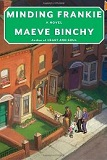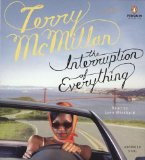Review of Minding Frankie, by Maeve Binchy
by Maeve Binchy
Alfred A. Knopf, New York, 2011. 383 pages.
Starred Review
Maeve Binchy’s books always end up keeping me reading until the small hours of the morning. Why, oh why, didn’t I know better than to start reading this book late at night, thinking I could stop after only one chapter? It’s not that the plot is exciting or action-packed, but you definitely get to caring about these people and want to find out what happens to them.
I do love the way she brings characters we’ve already seen in her other books. You don’t by any means have to have read the other books, but you have the sense that these are old friends. Everybody has a story in Maeve Binchy’s books, and in each book she focuses on a set of intertwined lives and the beautiful way they get through.
Minding Frankie is about the birth of a little girl.
Josie and Charles Lynch live in 23 St. Jarlath’s Crescent with their son Noel. They had always hoped Noel would be a priest, and set aside money early on for that purpose. Noel, however, was definitely not interested.
“Not so definite, however, was what he actually would like to do. Noel was vague about this, except to say he might like to run an office. Not work in an office, but run one. He showed no interest in studying office management or bookkeeping or accounting or in any areas where the careers department tried to direct him. He liked art, he said, but he didn’t want to paint. If pushed, he would say that he liked looking at paintings and thinking about them. He was good at drawing; he always had a notebook and a pencil with him and he was often to be found curled up in a corner sketching a face or an animal. This did not, of course, lead to any career path, but Noel had never expected it to. He did his homework at the kitchen table, sighing now and then, but rarely ever excited or enthusiastic. At the parent-teacher meetings Josie and Charles had inquired about this. They wondered, Does anything at school fire him up? Anything at all?”
Later, Noel got an office job instead of continuing his schooling.
“He met his work colleagues but without any great enthusiasm. They would not be his friends and companions any more than his fellow students at the Brothers had become mates. He didn’t want to be alone all the time, but it was often easier….
“He took to coming home later and later. He also took to visiting Casey’s pub on the journey home — a big barn of a place, both comforting and anonymous at the same time. It was familiar because everyone knew his name.”
Meanwhile, Noel’s parents aren’t sure what to do with the money they had saved to train Noel for the priesthood. And then Charles Lynch is told they don’t want him at his job any longer.
Into this home comes a woman from America, Charles Lynch’s niece Emily. Emily’s father moved to America years ago, and never kept in touch with his family. The family isn’t sure what to expect, but Emily is the sort of person who changes people’s lives by getting to know who they truly are.
She helps Charles and Josie realize what they really want to do is build a statue to St. Jarlath. And she helps Noel realize that he’s an alcoholic and needs help.
But then Noel gets a life-changing phone call. A woman he knew once and spent a drinking weekend with wants him to visit her in the hospital. She tells him she’s pregnant, and he’s the father. And she’s about to die of cancer.
So the book is about Noel trying to get his life together and be a father. The social worker assigned to his case doesn’t think he can do it. But thanks to Emily, there is a community of people around St. Jarlath’s Crescent who care and who help him with minding the little girl, Frankie.
That description doesn’t sound like a book that would keep me up reading through the night. But Maeve Binchy’s books are about Community. The characters are quirky, and some are powerfully flawed, but as we watch them working together, helping each other, working out problems, making mistakes, being wonderfully kind, we get hooked into their stories.
Another uplifting and life-affirming book by Maeve Binchy. I highly recommend getting to know the wonderful people who live in her books.
Find this review on Sonderbooks at: www.sonderbooks.com/Fiction/minding_frankie.html
Disclosure: I am an Amazon Affiliate, and will earn a small percentage if you order a book on Amazon after clicking through from my site.
Source: This review is based on a library book from the Fairfax County Public Library.






 The Elegance of the Hedgehog
The Elegance of the Hedgehog